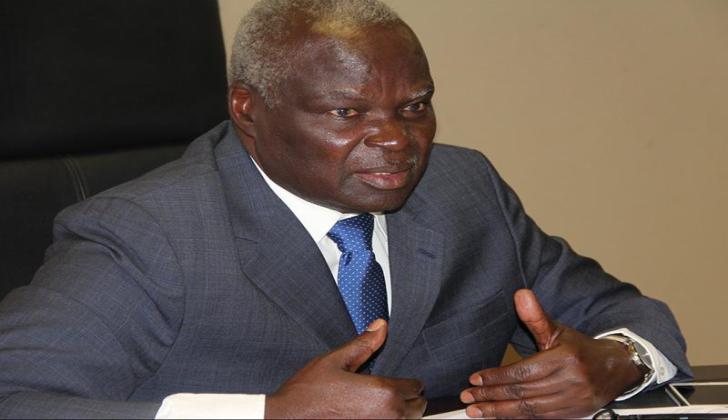News / National
Zimbabwe ministers convicted for borrowing delinquency
29 Oct 2024 at 16:37hrs |
1 Views

Public Service Minister July Moyo and Higher and Tertiary Education Minister Fredrick Shava have been ordered by the High Court to repay a staggering ZWG206,370,840, which was borrowed from critical social and development funds without prior Treasury approval. High Court Judge Justice Gladys Mhuri directed both ministers to return the money to various government-managed funds designed to support vulnerable groups, within a three-month timeframe.
The ruling follows a lawsuit filed by Marvellous Kumalo, a former opposition legislator, who claimed the ministers breached financial transparency and accountability laws. Kumalo accused the ministers of violating the Public Finance Management (Treasury Instructions), 2019, and Zimbabwe's Constitution by borrowing funds earmarked for the underprivileged and skilled workforce support, without the necessary Treasury clearance.
In his September 24, 2024, application, filed through lawyer Tonderai Bhatasara of Zimbabwe Lawyers for Human Rights, Kumalo argued that the ministers' actions undermined public financial governance principles. He cited Section 298(1)(a) of the Constitution, which mandates transparency and accountability in the management of public funds.
The funds in question include the Sustainable Livelihoods Fund, the Child Welfare Fund, the Older Persons Fund, the Industrial Training and Trade Testing Fund, and the Skilled Manpower Trade Testing and Certification Fund. These funds were established to support vulnerable groups, including children, the elderly, and skilled workers.
Kumalo contended that his constitutional right to accountable public fund administration had been violated, pointing to section 116 of the Public Finance Management (Treasury Instructions), 2019. This law prohibits borrowing from ministry funds for budget financing without prior written Treasury approval. Kumalo argued that the ministers' unauthorized borrowing, spanning from 2019 to 2023 and exposed in the 2023 Auditor-General's report, constituted a significant breach of public trust.
Justice Mhuri's order stipulates that Moyo must reimburse ZWL$515,657,986 (converted to ZWG206,368,508) borrowed from the Sustainable Livelihoods Fund, with a 90-day deadline. Additionally, the Public Service, Labour, and Social Welfare Minister is required to repay ZWL$3,544,915 (ZWG1,418.69) taken from the Child Welfare Fund and ZWL$153,468 (ZWG61.49) borrowed from the Older Persons Fund, all within the same period.
For Minister Shava, the court ordered reimbursement of ZWL$5,250 (ZWG2.10) borrowed from the Industrial Training and Trade Testing Fund, along with ZWL$2,123,558 (ZWG849.86) from the Skilled Manpower Trade Testing and Certification Fund within 90 days. Both ministers were also instructed to seek Treasury's authority for all previously borrowed funds within 60 days of the court's ruling.
Kumalo emphasized that he was driven by the need to uphold financial transparency and safeguard public funds from potential misuse, reiterating that adherence to constitutional principles is essential in maintaining public trust in government institutions.
The ruling follows a lawsuit filed by Marvellous Kumalo, a former opposition legislator, who claimed the ministers breached financial transparency and accountability laws. Kumalo accused the ministers of violating the Public Finance Management (Treasury Instructions), 2019, and Zimbabwe's Constitution by borrowing funds earmarked for the underprivileged and skilled workforce support, without the necessary Treasury clearance.
In his September 24, 2024, application, filed through lawyer Tonderai Bhatasara of Zimbabwe Lawyers for Human Rights, Kumalo argued that the ministers' actions undermined public financial governance principles. He cited Section 298(1)(a) of the Constitution, which mandates transparency and accountability in the management of public funds.
The funds in question include the Sustainable Livelihoods Fund, the Child Welfare Fund, the Older Persons Fund, the Industrial Training and Trade Testing Fund, and the Skilled Manpower Trade Testing and Certification Fund. These funds were established to support vulnerable groups, including children, the elderly, and skilled workers.
Kumalo contended that his constitutional right to accountable public fund administration had been violated, pointing to section 116 of the Public Finance Management (Treasury Instructions), 2019. This law prohibits borrowing from ministry funds for budget financing without prior written Treasury approval. Kumalo argued that the ministers' unauthorized borrowing, spanning from 2019 to 2023 and exposed in the 2023 Auditor-General's report, constituted a significant breach of public trust.
Justice Mhuri's order stipulates that Moyo must reimburse ZWL$515,657,986 (converted to ZWG206,368,508) borrowed from the Sustainable Livelihoods Fund, with a 90-day deadline. Additionally, the Public Service, Labour, and Social Welfare Minister is required to repay ZWL$3,544,915 (ZWG1,418.69) taken from the Child Welfare Fund and ZWL$153,468 (ZWG61.49) borrowed from the Older Persons Fund, all within the same period.
For Minister Shava, the court ordered reimbursement of ZWL$5,250 (ZWG2.10) borrowed from the Industrial Training and Trade Testing Fund, along with ZWL$2,123,558 (ZWG849.86) from the Skilled Manpower Trade Testing and Certification Fund within 90 days. Both ministers were also instructed to seek Treasury's authority for all previously borrowed funds within 60 days of the court's ruling.
Kumalo emphasized that he was driven by the need to uphold financial transparency and safeguard public funds from potential misuse, reiterating that adherence to constitutional principles is essential in maintaining public trust in government institutions.
Source - newzimbabwe
Join the discussion
Loading comments…
































